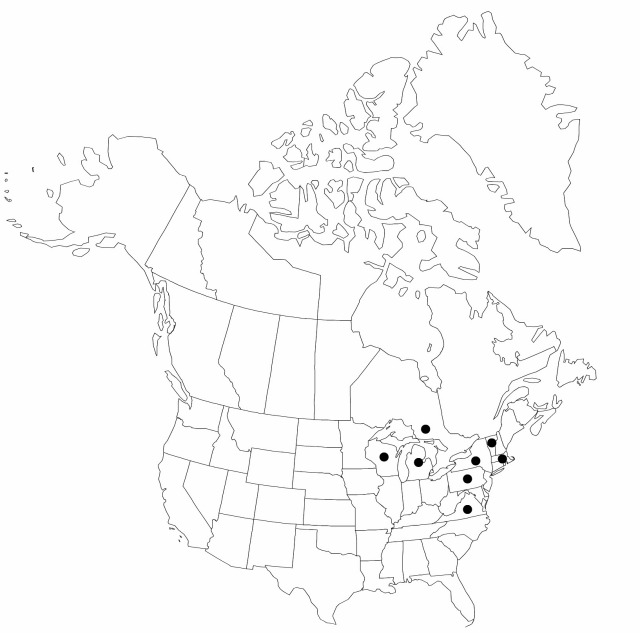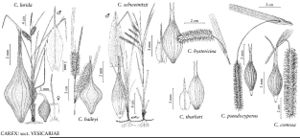Difference between revisions of "Carex schweinitzii"
Ann. Lyceum Nat. Hist. New York 1: 71. 1824.
FNA>Volume Importer |
imported>Volume Importer |
||
| (6 intermediate revisions by 2 users not shown) | |||
| Line 8: | Line 8: | ||
}} | }} | ||
|common_names=Carex de Schweinitz | |common_names=Carex de Schweinitz | ||
| + | |special_status={{Treatment/ID/Special_status | ||
| + | |code=F | ||
| + | |label=Illustrated | ||
| + | }}{{Treatment/ID/Special_status | ||
| + | |code=E | ||
| + | |label=Endemic | ||
| + | }} | ||
|basionyms= | |basionyms= | ||
|synonyms= | |synonyms= | ||
| Line 24: | Line 31: | ||
|elevation=100–600 m | |elevation=100–600 m | ||
|distribution=Ont.;Conn.;Mass.;Mich.;Mo.;N.Y.;Pa.;Vt.;Va.;Wis. | |distribution=Ont.;Conn.;Mass.;Mich.;Mo.;N.Y.;Pa.;Vt.;Va.;Wis. | ||
| − | |discussion=<p>Carex schweinitzii is very local and uncommon but often forms large colonies where present. It hybridizes occasionally with C. hystericina. The single, old Missouri collection (G. Yatskievych 1999+) seems so far disjunct as to suggest that there may have been a label mixup.</p> | + | |discussion=<p><i>Carex schweinitzii</i> is very local and uncommon but often forms large colonies where present. It hybridizes occasionally with <i>C. hystericina</i>. The single, old Missouri collection (G. Yatskievych 1999+) seems so far disjunct as to suggest that there may have been a label mixup.</p> |
|tables= | |tables= | ||
|references= | |references= | ||
| Line 33: | Line 40: | ||
-->{{#Taxon: | -->{{#Taxon: | ||
name=Carex schweinitzii | name=Carex schweinitzii | ||
| − | |||
|authority=Dewey ex Schweinitz | |authority=Dewey ex Schweinitz | ||
|rank=species | |rank=species | ||
| Line 47: | Line 53: | ||
|publication title=Ann. Lyceum Nat. Hist. New York | |publication title=Ann. Lyceum Nat. Hist. New York | ||
|publication year=1824 | |publication year=1824 | ||
| − | |special status= | + | |special status=Illustrated;Endemic |
| − | |source xml=https:// | + | |source xml=https://bitbucket.org/aafc-mbb/fna-data-curation/src/2e0870ddd59836b60bcf96646a41e87ea5a5943a/coarse_grained_fna_xml/V23/V23_948.xml |
|genus=Carex | |genus=Carex | ||
|section=Carex sect. Vesicariae | |section=Carex sect. Vesicariae | ||
Latest revision as of 20:44, 5 November 2020
Plants extensively colonial; rhizomes long. Culms trigonous in cross section, 18–65 cm, smooth distally. Leaves: basal sheaths pale brown; ligules as wide to wider than long; blades pale to mid green, flat to W-shaped, 4–11 mm wide, glabrous. Inflorescences 8–24 cm; proximal bract 11–37 cm, exceeding inflorescence; proximal 2–4 spikes pistillate, erect or often the proximal ascending to spreading; terminal 1(–2) spikes staminate. Pistillate scales lanceolate-acuminate, 2.4–6.9 × 0.3–0.9 mm, shorter than or the proximal longer than perigynia, margins serrulate-ciliate, apex with prominent scabrous awn. Staminate scales acute to acuminate, smooth except at tip. Perigynia ascending, 7–11-veined, narrowly elliptic, 4.2–7 × 1.3–1.8 mm, apex tapered; beak 1.4–2.4 mm, bidentulate, smooth, teeth straight, 0.2–0.5 mm. Stigmas 3. Achenes pale brown, trigonous, smooth.
Phenology: Fruiting Jun–Jul.
Habitat: Shallow cold streams, springheads, seeps, margins of fens, and seepy stream, pond, and lakeshores in open or lightly shaded sites, in highly calcareous soils
Elevation: 100–600 m
Distribution

Ont., Conn., Mass., Mich., Mo., N.Y., Pa., Vt., Va., Wis.
Discussion
Carex schweinitzii is very local and uncommon but often forms large colonies where present. It hybridizes occasionally with C. hystericina. The single, old Missouri collection (G. Yatskievych 1999+) seems so far disjunct as to suggest that there may have been a label mixup.
Selected References
None.
